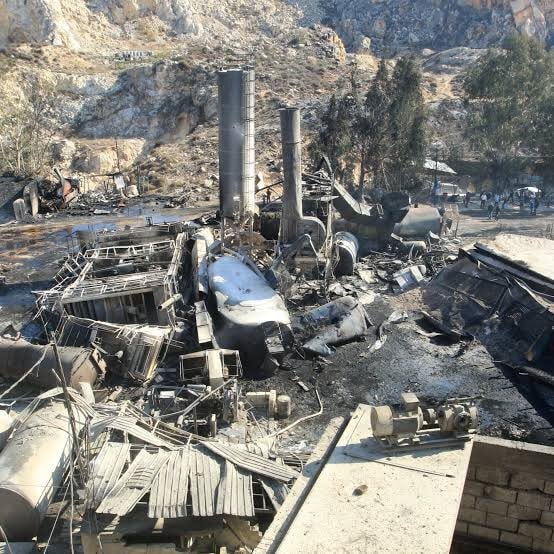Targeting Lebanon's infrastructure: A war on the foundations of resilience

BEIRUT—In modern warfare, battles are no longer fought solely on military frontlines. Vital infrastructure, the backbone of daily life, has become a deliberate target in a strategy aimed at breaking the will of the Lebanese people and undermining their resilience.
This has one clear and direct objective: dragging Lebanon into a hasty negotiation with Israel to pave the way for normalization at a later date.
By eroding the foundations of daily life and intensifying the living crisis, Israel is destabilizing the social fabric and seeking to convert economic pressures into political ones, in hopes of compelling the parties to accept closed-door negotiations that would strip the resistance of its popular legitimacy.
Obviously, the ongoing strikes are not merely a military action, but rather a strategic pressure tool aimed at sending a clear message that there is no separation between the resistance and the society that embraces it.
The South Lebanon Water Establishment announced that the recent Israeli raids destroyed its strategic fuel depot, which contained half a million liters of diesel.
This depot was not a military installation but a service facility that provided electricity to southern villages and towns, powering the generators on which local water stations depend. Destroying it would effectively deprive tens of thousands of families of water and disrupt hospitals, bakeries and public institutions.
The targeting did not stop there. Warplanes launched raids on a quarry and a concrete kiln in the town of Ansar, resulting in casualties and significant property damage. The kiln that was hit supplied construction materials and cement to reconstruction projects in the south and served dozens of municipalities and public institutions.
With this bombing, Israel was not striking a technical site, but rather the will to rebuild itself. Nevertheless, the kiln owners' association declared that "reconstruction will continue despite the intimidation," emphasizing that it would not allow the Israeli occupation regime to impose a "life of rubble" on the people.
These attacks are not unprecedented in the regime’s record, but they mark a dangerous shift in the nature of Israeli warfare, which now combines ground assaults with economic and psychological pressure.
When infrastructure is destroyed, agricultural and industrial production halts, job opportunities diminish, poverty deepens, and the path to migration and displacement is forced open.
Thus, the ultimate goal is realized: to empty the South of its population and transform it into a region rendered incapable of sustaining life. This is the silent war that continues even after the fighting has ceased.
In the capital Beirut the scene is no less absurd. While volunteers from the Farah Al-Ataa Association continued to rebuild Al-Mamoun Street, which was destroyed by an Israeli airstrike in September 2024, they were surprised by the temporary suspension of the project based on a decision by the security forces under the pretext of minor violations related to tiles and glass facades!
This paradox reflects the duality of the Lebanese state: complete absence during times of war, and administrative strictness when citizens are carrying out what is at the core of its responsibilities.
Meanwhile, reports from the UN Food and Agriculture Organization (FAO) reveal the scale of the disaster resulting from the Israeli targeting of agricultural lands and productive infrastructure.
More than two million livestock and poultry were lost, while vast areas of farmland and forests were burned, prompting an emergency recovery plan estimated at $263 million.
The plan includes phases to rehabilitate farmlands and infrastructure and help farmers resume their work, but funding remains insufficient, and government efforts are fragmented.
Moreover, the UN Special Rapporteur on extrajudicial, summary or arbitrary executions, Morris Tidball-Binz, stated that these practices may amount to war crimes, given the absence of any evidence of military use of the bombed targets: International humanitarian law is clear: no civilian facility may be targeted unless it becomes a direct military objective, and any disproportionate harm to civilians is a flagrant violation.
An analysis of these facts reveals that targeting infrastructure is part of a strategy to pressure the resistance's natural environment. When water and electricity are cut off, and roads and factories are destroyed, steadfastness becomes a daily burden for the people.
Through this, the enemy seeks to sow discontent and despair in the souls of the southerners, and to make the resistance a burden rather than a shield. But this equation did not succeed in 1996 or 2006, and it will not succeed today.
This is because the society, which rebuilt its environment through self-effort and became more organized and united after each war, has come to realize that reconstruction is also an act of resistance.
Hence, we see civil initiatives multiplying despite the bombardment, local associations filling the state's vacuum, and municipalities coordinating to provide services, even with limited resources.
When communities rise from the rubble, they rebuild what was destroyed, transform the devastation into an opportunity for review and development, and proving that aggression, no matter how intense, cannot eliminate life.
Leave a Comment